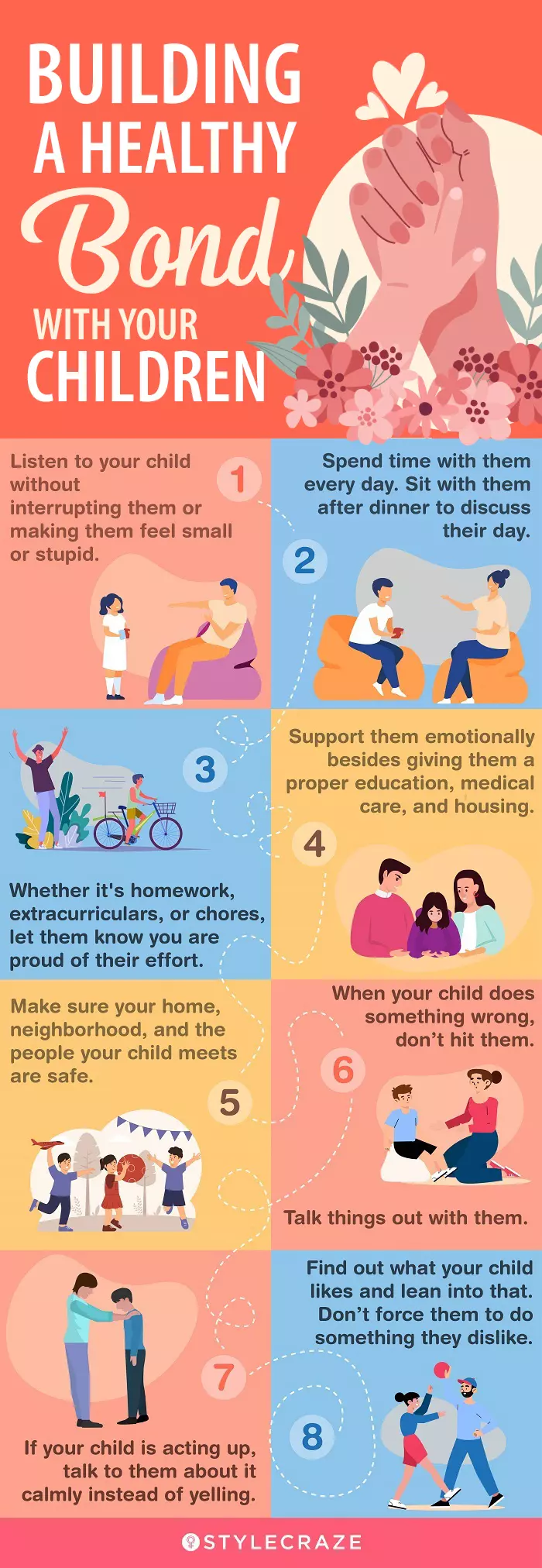11 Reasons Grown Children Ignore Their Parents & What To Do
Learn how to respond the right way when your children avoid communication with you.

Image: Midjourney/ StyleCraze Design Team
You may witness grown children who ignore and dismiss their aging parents. This implies parent-child relationships can sometimes become complex. Some children may grow up feeling disconnected from their parents. In addition, many serious factors, such as generational gaps, abuse, family conflict, and unhealthy mental states, may lead to strained relationships between parents and children. Here is how to respond when your child ignores you and the signs that indicate they feel distant. Read on for more details.
In This Article
Why Do Grown Children Ignore Their Parents?

1. Abuse And Neglect
Children who have experienced abuse from their family or relatives tend to grow apart from them. The abuse can be verbal, psychological, sexual, or physical. Research says that even neglect is a kind of child abuse (1). Parental neglect can make a child feel very isolated.
If both parents are working or busy with their lives, neglecting the children’s needs, a rift may form between them and their children. Emotional unavailability is another form of neglect, which can make the children feel estranged from their parents. If you have abused or neglected your child, they might feel angry, resentful, and bitter towards you.
Child abuse and neglect can lead to psychological issues, such as depression, low self-esteem, and difficulty in maintaining relationships. The abused child often feels isolated, fearful, and distrustful. Children can also develop attachment disorders due to abuse and neglect, which hinders their ability to form healthy peer and social and romantic relationships. They are also more likely to develop antisocial traits as they grow up.
2. Difference In Opinions
A consistent difference in opinions and values due to the generational gap may lead the children to grow apart from their parents and cause a communication breakdown.
Political opinions, gender rights, career expectations, and age-old values are common grounds for differences in opinions between children and their parents. It is how we communicate differences that matter. We can validate others without agreeing with their viewpoint.
When the values are not aligned, conflict can arise. If your child believes they cannot openly discuss their opinions with you, this is a sign there is already a fracture. You perhaps were emotionally disapproving or dismissing.
3. Controlling Parents
Being controlling or coercive towards your children is a type of abuse and a classic trait of a toxic mother or father. If the child feels too constrained by their parents, they may grow distant from family and relatives. Parents who control their children’s freedom and overall life hinder the child’s personal growth and experience.
Forcing your child to stay home or do things they are not interested in will take them away from you. You need to give them enough space to hang out with their friends, participate in extracurricular activities, and do the things that they love. It is about finding balance as our children mature and develop. Creating and maintaining a healthy hierarchy is essential. If this is set into place from the beginning, we increase the likelihood of our children respecting and trusting us. When respect and trust are present, our children are more likely to listen to us.
4. Lack Of Support
If parents do not support something their child loves, it may cause a tear in the relationship
. This resentment may grow over the years if not dealt with soon. It is important for parents to support their children’s hobbies, likes, dreams, and interests. Even if the parent does not agree with their children’s passion or opinion, showing support goes a long way in building a strong relationship.
A lack of support can fracture emotional safety and emotional connection. Supporting your child can help foster a deeper relationship, provided that the interests, passions, and pastimes do not revolve around unsafe pursuits. Finding ways to support your child can be challenging when a lack of empathy is brought on by basic differences in beliefs.
5. Unsafe Environment
Placing your child in an unsafe environment may cause cracks in your relationship with them. This could be a one-time instance, or the kind of people you let into your house may be unsafe for your child.
An example of an unsafe environment is residential instability – you constantly change houses. If you move around a lot, your child might feel less connected to the house and parents. The same goes for the environment inside the house. If one of the parents is an alcoholic or abusive, the children are less likely to bond with them.
As humans, we need stability and structure to know that our lives will offer safety and reliability. Children crave this and it is essential to their overall development.
Other unsafe environments include constantly changing your children’s care-givers, keeping your children with physically, verbally, or sexually abusive relatives or friends, or forcing your children to visit schools or parks where they are constantly bullied.
6. Family Expectations
Some families hold their children to unrealistic expectations, which often makes the kids depleted and resentful. For instance, if a mother forces her son to take up a particular course of life or job that he doesn’t like, it may lead him away from her. This may also lead to a toxic mother-and-son relationship. The parents may expect the child to follow their political, gender, religious, and cultural views, which the child may not agree with. This burden of expectations can create a gap between the child and their parents.
The emotional equation for disappointment is expectation minus reality. Not all expectations will be met in our relationships. However, dialoguing early and finding areas of compromise is beneficial to the relationship.
Instead of discussing the difference of opinions and showing support and love, if the parents brush them away, it will make the child resentful towards them. Your child may think your opinions are outdated, so forcing them to submit will lead to estrangement.
7. Mental Health Issues
Mental health issues can often lead children away from their parents. If parents don’t understand or accept mental issues, it becomes difficult for the children to communicate with them.
Some parents take the ‘tough love’ route, forcing the child to deal with their mental struggles incorrectly instead of seeking professional help. If a child is bullied at school, some parents may think they need to go through that bullying to ‘be a man’. This may impact the child’s mental state even more and negatively affect the parent-child relationship. Understanding your emotional philosophy as a parent and knowing how this influences emotional safety can increase your awareness of how responding like this affects the parent-child relationship.
8. Traumatic Events
Witnessing traumatic events, such as sexual assault, abuse, or alcoholic parents, may lead children to separate from the family. If the child tries to share their traumatic experience with the parents and they invalidate their emotions or refuse to accept, it causes a rift between them. This can have a devastating lifelong impact on your child’s psychological, emotional, mental, and physical health.
9. Divorce
In most cases, when parents get divorced, they get 50/50 custody of the child unless the court says otherwise. However, if they do not take their parental rights and responsibilities seriously, the children may fall apart from one or both of the parents. If the child views one of the parents as the reason for the divorce, they might find that parent the “bad-one” who disrupted their family. Also, if a parent remarries after divorce, it may cause an estranged relationship with the child if they do not like the new partner. These family dynamics may affect the child’s mental health deeply.
10. Favoritism Towards One Child
Sometimes, a child may feel unfairly treated by their parents if they show favoritism towards another child. This may lead the child to think that the parent prefers the other child over them. If the parents always side with one child during an argument, the other may resent their sibling and the parents. While this might not be a conscious thing that parents do purposely, it still affects the child.
11. Career Demands
Demanding careers make it challenging for grown kids to maintain a close relationship with their parents. They have to devote most of their time towards their goals, which in this fast-paced life leaves little time and energy to pursue familial matters actively. Geographical distance exacerbates the issue, where parents and children who live in different states and countries cannot meet and spend time with each other on weekends and holidays.
While this may be an unavoidable hindrance in the relationship between grown children and their parents, open communication and understanding can help both parties bridge the gap. Organizing virtual meetings from time to time, and talking to them over the phone or messaging them ever so often can help maintain and keep the relationship strong.
Here are a few signs that indicate your child is growing apart from you.
Signs That Your Child Is Ignoring You

- Break Of Contact: If your child doesn’t communicate with you either in person or over call, it can be a sign of estrangement. No matter how much you try to connect with your child if they do not respond, it indicates they do not feel connected with you. Also, if your child contacts you once a month with barely anything to say or share, may be they are ignoring you politely.
- No Interest In Family Events: If your child refuses to participate in family functions, they may be trying to stay away from you. This will cause a rift between your child and your relatives in the long run.
- Communicate More With Relatives Than You: If you are getting more information about your child from a relative rather than the child telling you, it is clear they may be ignoring you. If your child is not telling you about their achievements, new accomplishments, or big events in their life, they don’t feel connected with you.
- No Meetings: Your child may outrightly refuse to meet you, or they may constantly come up with excuses to not meet you. This is a clear sign that they are ignoring you. They might make time to meet other relatives, siblings, or friends, but they don’t make it a point to meet you. Even if they come to meet you, it’s only for a very short period. It could be that your child has set boundaries for the relationship but has not verbally communicated to you.
 Quick Tip
Quick TipOther signs your child is ignoring you is if they stop inviting you to events, forget to wish you on your birthday, and do not reply to your cards and gifts.
Are you wondering if your child is ignoring you or they are just busy? Read the next section to understand how often adult children usually talk to their parents.
How Often Do Adult Children Speak To Their Parents

Children in the launching stage of the family life cycle are now at the age where they are in the process of moving from living at home to forming their own identities and transitioning into living independently. Some adult children may speak to their parents at least daily or every alternate days. But this is mostly true for college kids rather than working adults. The frequency with which adult children contact their parents depends on their needs, schedules, and leisure.
Adult children with jobs, responsibilities, and families (spouse and children) may not call often. However, if your child keeps in touch with you and shares information about their lives, it implies they are not ignoring you. It can be an indicator that the relationship is healthy.
Now that you know the clear signs your child is ignoring you, here are a few ways to help you cope with it.
What Can You Do To Improve The Relationship?

- Apologize: A great first step is to process regrets with your child together and apologize for them. This allows them the opportunity to also process their resentments. Most of the time, parents refuse to apologize to their children. But an apology can go a long way in rebuilding your relationship with your kid. It is important to back your apology with actions. If your child thinks you are just all words but no action, it might worsen the situation.
- Listen: Instead of getting your child to listen to your opinion, listen to theirs. Being a good listener is more than just active listening. Listen to understand them deeply, empathize, and validate. Don’t interrupt them when they speak. Hear them out with an open mind. Talk to them about the things you don’t understand and listen to their answers.
- Accept: It is important for a child to know that their parents accept them for who they are. So, be more accepting and supportive towards your children. Try to accept people your child loves and things they are interested in.
Bebe Nicholson, a blogger, shared how her sons celebrate Mother’s Day with their wives and how she understands why it is important. She wrote, “My sons like to make sure their wives have a good Mother’s Day, and I realize they are in the trenches taking care of my grandchildren. One of my daughters-in-law likes to visit her mother on Mother’s Day, and since they live hundreds of miles away, this doesn’t lead to any jealous vibes from me (i).”
- Respect: Respect is earned; it is not freely given. Be it a father and son or a mom and daughter relationship, you have to respect your child’s opinions to earn their respect. Just because they are younger than you does not mean they have to listen to you and follow your beliefs. Your views on respect may differ from those of your child. Understanding their point of view could help in “earning” their respect in the long run, even though you may not necessarily agree with it.
- Do Not Exert Pressure: Stop pressurizing your child to do things they don’t want to. This includes education, career, and marriage. Don’t force them to talk to you as well. Just because you are their parent, it doesn’t entitle you to their respect and conversation. It has to be earned, and you need to be there for them.
- Seek Professional Help: If you have mental health issues causing the tear with your child, you need to seek help. If your child is experiencing mental health issues, try to find a specialist who can explain your child’s situation to you. If your child is comfortable, get them to speak to a family therapist.
- Let Go: Sometimes, you have to realize that the bridge is burned. Your child has their own life now, and you have to let go of them. Forcing your way into your child’s life may work temporarily, but it often increases the rift. However, let them know that you are there if they ever want to talk or need anything, and just let them be. If your child continues to set boundaries and makes the decision to limit you in their life, use this opportunity to work on yourself to gain perspective on your unhealthy patterns that may have caused the strain in the relationship.
 Quick Tip
Quick TipAvoid emotionally blackmailing them and using hurtful words and phrases. This will cause you emotional distress. Remember, you can’t control whom they choose to be with or how they behave.
The next section will answer how soon you can expect to reconcile with your estranged child and what factors decide how long you will be kept cut off from their lives.
How Long Does The Estrangement Last?

Some estrangements may last for a few weeks to months. Some may be more serious, lasting for several years, depending on the cause of the estrangement. It also depends on what you do to make your child believe you want to repair the relationship. If you aren’t doing anything, it may never get repaired.
Parents need to take the first step and show support to rebuild the relationship. Don’t expect your child to make the first move; you do it. This will make your child realize that you are serious about them and go a long way in developing a strong and secured bond.
Infographic: Building A Healthy Bond With Your Children
How you treat your children when they are young is very important in determining how good or bad your bond with them will be when they grow up. Early understanding of family hierarchy and upholding a healthy family structure during growth are key to strengthening the connection.
You can follow certain pointers to make sure you build a strong, healthy, and beautiful bond with your child. Apart from loving them unconditionally, you need to support and encourage them.
Check out the infographic below to learn how you can build a healthy relationship with your child. Illustration: StyleCraze Design Team
When grown children ignore their parents, it is most often due to certain unmet expectations, abuse , or neglect. It could also be due to a prior traumatic experience, lack of support, or unrealistic family expectations. In certain cases when everything is fine, the mental health of the child affects the way he bonds and connects with his parents. Lack of communication or interest in family events may indicate that the grown up child is not keen about his parents.
Frequently Asked Questions
What is the most psychologically damaging thing you can say to a child?
There are several psychologically damaging things that parents can say to a child. But most importantly, “I don’t love you” or saying nothing at all seriously hurts your child.
How do you deal with a disrespectful grown daughter?
Engage with your daughter, acknowledge the mistake or hurt you may have caused, and also learn to set boundaries; these may help deal with a disrespectful grown daughter.
How do you let go of a child who hates you?
Try to listen to your child, letting them know how much love you have, and also try to change yourself to avoid the same mistake (if you begin communicating again).
Key Takeaways
- Neglect and abuse in childhood, a wide difference in values and ideologies and divorce are some reasons why a child may ignore their parents after growing up.
- Behavior such as avoiding communication whether in person or over call or rare catch ups with no real sharing of what’s going on in their lives is often a sign that a grown child is ignoring their parents.
- While a relationship can’t be forcefully healed, parents can apologize for mistakes on their part, show acceptance and respect for their children and practice active listening when there is communication so that the relationship gets a chance to heal.
Discover insights and unveil the compelling reasons your grown kids might harbor deep resentment towards you. Prepare yourself for eye-opening revelations. Watch this video!
Personal Experience: Source
StyleCraze's articles are interwoven with authentic personal narratives that provide depth and resonance to our content. Below are the sources of the personal accounts referenced in this article.
i. What if Your Children Ignore You on Mother’s Day?https://medium.com/the-partnered-pen/what-if-your-children-ignore-you-on-mothers-day-1ec9c405e3be
References
Articles on StyleCraze are backed by verified information from peer-reviewed and academic research papers, reputed organizations, research institutions, and medical associations to ensure accuracy and relevance. Read our editorial policy to learn more.
- Child Abuse in the Family: An Analytical Study
https://www.researchgate.net/publication/237494941_Child_Abuse_in_the_Family_An_Analytical_Study
Read full bio of Erin Williams
Read full bio of Subhrojyoti Mukherjee
Read full bio of Sangita Goel


























Community Experiences
Join the conversation and become a part of our empowering community! Share your stories, experiences, and insights to connect with other beauty, lifestyle, and health enthusiasts.